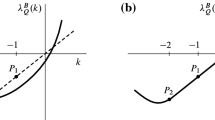Abstract
Optimization via simulation is a promising technique to solve maximum likelihood problems in incomplete data models. Among the techniques proposed to date to solve this problem, the MCEM algorithm proposed by Wei & Tanner (1991) plays a preeminent role. Perhaps surprisingly, very little is known on the convergence of this algorithm and on the strategies to monitor this convergence. A particular emphasis is given on the stability issue (which is not guaranteed in the original proposal by Wei & Tanner, 1991). A random truncation strategy, inspired by Chen’s truncation method for stochastic approximation algorithms, is proposed and analysed.
Access this chapter
Tax calculation will be finalised at checkout
Purchases are for personal use only
Preview
Unable to display preview. Download preview PDF.
Similar content being viewed by others
References
Chen, H.F., Guo, L. & Gao, A.J. (1988). Convergence and robustness of the Robbins-Monro algorithm truncated at randomly varying bounds. Stoch. Proces. Applic., 27, 217–231.
Dempster, A., Laird, N. & Rubin, D. (1977). Maximum-likelihood from incomplete data via the EM algorithm. Journal of the Royal Statistical Society B, 39, 1–38.
Hale (1987). Asymptotic behavior of dissipative systems. Providence: American Mathematical Society.
Haraux, A., (1991).Systemes dynamiques dissipatifs et applications. Paris: Masson.
Kushner, H. J. & Yin, G. G. (1997). Stochastic approximation algorithms and applications. New York: Springer Verlag.
Meyn, S.P. & Tweedie, R.L. (1993). Markov chains and stochastic stability. New York: Springer Verlag.
Robert, C., (1996). Methoden de Monte-Carlo par chaines de Markov. Economica.
Roberts, G. O. & Tweedie, R. L. (1996). Geometric convergence and central limit theorems for multidimensional Metropolis-Hasting algorithms. Biometrika, 83, 95–100.
Shapiro, A. & Wardi, Y. (1996). Convergence analysis of stochastic algorithms. Mathematics of operations research, 21, 615–628.
Wei, G. C. G. & Tanner, M. A. (1991). A Monte Carlo implementation of the EM algorithm and the poor’s man data augmentation algorithms. J. Amer. Statist. Assoc., 85, 699–704.
Author information
Authors and Affiliations
Editor information
Editors and Affiliations
Rights and permissions
Copyright information
© 1998 Springer-Verlag Berlin Heidelberg
About this paper
Cite this paper
Fort, G., Moulines, E., Soulier, P. (1998). On the Convergence of Iterated Random Maps with Applications to the MCEM Algorithm. In: Payne, R., Green, P. (eds) COMPSTAT. Physica, Heidelberg. https://doi.org/10.1007/978-3-662-01131-7_41
Download citation
DOI: https://doi.org/10.1007/978-3-662-01131-7_41
Publisher Name: Physica, Heidelberg
Print ISBN: 978-3-7908-1131-5
Online ISBN: 978-3-662-01131-7
eBook Packages: Springer Book Archive



